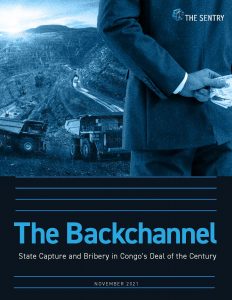 Read the full report
Read the full report
> En français
> Read more from the Congo Hold-up leak
When China Railway Group and Sinohydro, two major Chinese construction companies, pledged more than a decade ago to help rebuild and expand infrastructure in the Democratic Republic of Congo (DRC) in return for a sizeable chunk of the country’s mineral wealth, they took a giant gamble. The multibillion-dollar effort matched President Joseph Kabila’s soaring political ambitions and the nation’s pressing needs for roads, railways, and hospitals, yet its success was far from assured.
The largest-ever leak of African financial records and data, obtained by the Platform to Protect Whistleblowers in Africa (PPLAAF) and Mediapart and shared with The Sentry by PPLAAF and the European Investigative Collaborations (EIC) network, now shows that the Chinese state-owned enterprises had a few aces in the hole all along: a shell company, a slick intermediary with a network of companies, and BGFIBank DRC.* The trove of documents and data, called the Congo Hold-up leak, reveals that the state enterprises used a middleman with accounts at the bank run by the president’s brother to pump tens of millions of dollars into the pockets of the Kabilas, their associates, and businesses at crucial junctures in what are known as the Sicomines agreements.
Congo Hold-up
Read more from the Congo Hold-up leak
These arrangements, which the news media dubbed the “deal of the century,” lacked transparency from the start.* * And in drawing back the curtains, The Sentry’s investigation has found clear evidence of corruption showing that Chinese corporations colluded with power players in the DRC to secure access to billions of dollars’ worth of natural resources—all with an assist from the world of global high finance. Put differently, a generational investment in the DRC’s potential, one meant to help heal the wounds from decades of mismanagement and successive wars, in fact served another purpose all too prevalent in the world’s resource-dependent economies: lining the pockets of the powerful with the wealth buried beneath the impoverished population’s feet.
The leaked files show that the shell company at the center of the scheme—Congo Construction Company (CCC)—received $55 million from foreign sources apparently intended for Kabila and his entourage. CCC later funneled $10 million back out to safety as the Kabila family faced losing both political power and control over the bank. All these funds transited the international financial system, flowing through major financial institutions like Citibank and Commerzbank to and from a country plagued by corruption, doing so under false pretenses and with little to no documentation, exposing how financial giants whose market values can dwarf the entire Congolese economy fail to protect the world’s poor from kleptocracy.
As their time at BGFIBank DRC came to an end, top executives at the bank, which is the subsidiary of a Gabonese corporate parent, battled a dogged internal auditor who accused them of money laundering, pointing to transactions that bore worrying indications of forgery and fraud. The auditor alleged that the executive team hid payments by moving bulk cash instead of making proper transfers and moved millions of dollars based on documents that appeared not to exist and for clients they hadn’t even fully identified. He also blamed them for stonewalling his inquiries and, in his own words, “blowing off” his concerns while generally operating “in another world.” * *
CCC’s role has all the hallmarks of a massive bribery scheme linked to the Sicomines deal: large amounts of money flowing into the accounts of people with close ties to the president, funds transiting through a bank run by the president’s brother without any meaningful scrutiny, insufficient or inaccurate documentation to justify the transfers, companies with unclear ownership, intermediaries with conflicts of interest, and decisions made in secret with significant financial benefits for the provider of the illicit funds. This in a deal between state actors in the DRC and China, two countries known to have a high risk of corruption.
By right, the Congolese people own many of the strategic mineral deposits driving the world’s latest wave of industrialization, enriching mining companies, engineers, and manufacturers while greatly benefiting end consumers of electric vehicles, mobile phones, and laptops. But Kabila’s ruling clique captured the institutions that were supposed to represent the Congolese people’s interests writ large, and the same individuals also captured the crucial element needed to secure their ill-gotten gains: a bank. Though Kabila worked to sell Congolese voters on a Sino-Congolese project that would principally be to their benefit, modernizing their country and freeing them from destitution, these events also entrenched a system that denies the public the proper and honest administration of their extraordinary wealth, deferring the DRC’s hopes for transparency and weighing on its long-awaited recovery.
None of the companies behind the minerals-for-infrastructure deal responded to requests for comment, nor did former President Joseph Kabila or any members of his family. Furthermore, the bank at the center of the leak—BGFIBank DRC—did not respond to detailed questions about the matters discussed in this report.
Key recommendations
The Sentry is making the following key recommendations in the wake of this investigation. The full text of these recommendations appears at the end of this report.
- Global financial institutions and Congolese banks should investigate the activities outlined in this report and institute measures to prevent a repeat. In particular, global and Congolese banks should work together to enhance customer due diligence standards, investigate the findings in this report, and generally improve monitoring of transactions related to the DRC that may present a high risk for illicit financial activity.
- The United States, European Union, and United Kingdom should investigate whether activities outlined in this report constitute violations of law; issue public advisories concerning the money laundering risk associated with the DRC and complex infrastructure financing deals linked to certain Chinese state-owned enterprises; and, where appropriate, impose targeted sanctions on key individuals and companies named in this report.
- The government of the DRC should institute a range of measures to identify any violations of law connected to the activities in this report, redouble the independence of key oversight agencies, bolster monitoring of potentially risky transactions, use robust asset declarations and information-sharing between government authorities and commercial banks, and generally make it more difficult for officials to violate public trust.
Read the full report and recommendations >

